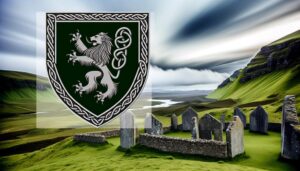Gavin Name Meaning and Origin
The name Gavin has its origins in the Old Welsh name 'Gawain,' renowned for his bravery and chivalry in Arthurian legends. Linguistically derived from 'Gwalchgwyn,' meaning 'white hawk' in Welsh, Gavin embodies valor and nobility deeply rooted in Celtic traditions.
The name evolved to Gavin through historical linguistic shifts, especially during the Norman Conquest. In modern times, Gavin's appeal is reinforced by its phonetic harmony and literary associations.
The name continues to blend historical significance with contemporary sensibilities, resonating with those seeking a name with profound cultural and historical depth. Explore further to uncover more about Gavin's rich legacy.

Key Takeaways
- Gavin originates from the Old Welsh name 'Gawain,' linked to Arthurian legend.
- The name means 'white hawk,' derived from Old Welsh 'Gwalchgwyn.'
- It reflects virtues like chivalry, bravery, and loyalty.
- The name evolved through linguistic transformations, especially post-Norman Conquest.
- Gavin has seen a resurgence in modern times due to its historical and phonetic appeal.
Historical Roots
The name Gavin, rooted in medieval history, originates from the Old Welsh name 'Gawain,' which holds significant cultural and literary importance in Arthurian legend. Gawain, a key figure in the tales of King Arthur, is renowned for his chivalry, bravery, and loyalty. This historical context imbues the name Gavin with a sense of nobility and valor.
Linguistically, 'Gawain' is derived from the Welsh elements 'gwalch' meaning 'hawk' and 'gwyn' meaning 'white' or 'blessed.' Over time, the name evolved through various linguistic transformations, ultimately becoming Gavin in contemporary usage. This evolution reflects the dynamic nature of language and cultural exchange, illustrating how historical narratives and linguistic shifts intertwine to shape modern names.
Celtic Origins
Building on its medieval roots, the name Gavin also holds deep connections to Celtic traditions and languages, which enrich its cultural significance.
Originating from the Old Welsh name 'Gawain,' Gavin is derived from 'Gwalchgwyn,' meaning 'white hawk' or 'falcon.' This etymology underscores the importance of nature and symbolism in Celtic culture.
The name is deeply embedded in the linguistic fabric of the Celtic-speaking regions, reflecting the valor and nobility often attributed to its bearers. Historical records suggest its prevalence among Celtic tribes, indicating a long-standing cultural affinity.
Moreover, the name's consistent usage over centuries highlights its enduring appeal and the Celtic tradition of honoring ancestral heritage through nomenclature.
The Legend of Sir Gawain
Integral in Arthurian legends, Sir Gawain stands as a paragon of knightly virtue and chivalry, embodying the ideals of loyalty, bravery, and honor. His narrative is pivotal in medieval literature, particularly in the 14th-century Middle English chivalric romance 'Sir Gawain and the Green Knight.'
This tale elucidates his moral fortitude and human frailty through:
- The Beheading Game: A challenge testing his courage and adherence to promises.
- The Exchange of Winnings: Demonstrating his integrity and honesty in interactions.
- The Temptation Scene: Highlighting his struggle with ethical dilemmas and personal desires.
These episodes are not merely fanciful tales but serve as didactic tools, reflecting the chivalric code's complexity and its impact on medieval societal values.
Cultural Evolution
Tracing the etymological journey of the name Gavin reveals its transformation and adaptation across various cultures and historical periods. Originally derived from the medieval name Gawain, its roots can be traced back to the Welsh name Gwalchgwyn, meaning "white hawk". Over centuries, the name evolved through linguistic shifts and cultural exchanges, adapting to various vernaculars and societal contexts.
| Time Period | Region | Cultural Influence |
|---|---|---|
| Medieval Era | Wales | Arthurian Legends |
| Norman Conquest | England | French Linguistic Influence |
| Modern Era | Global | Popularization through Literature and Media |
During the Norman Conquest, the name Gawain was Anglicized to Gavin, reflecting the Norman impact on English nomenclature. This evolution underscores the dynamic nature of language and cultural exchange.
Modern Popularity
In contemporary times, the name Gavin has seen a notable resurgence in popularity, driven by its appearances in literature, media, and its modern, appealing phonetic qualities. This resurgence can be attributed to several factors:
- Literary Influence: The name Gavin has been featured in various novels, often associated with strong, charismatic characters.
- Media Exposure: Television shows and films have popularized the name, making it more familiar and attractive to new parents.
- Phonetic Appeal: The name Gavin combines a soft beginning with a strong ending, creating a balanced and harmonious sound.
Historically, Gavin has roots in medieval Scotland, but its renewed prevalence reflects contemporary tastes for names that blend historical significance with modern sensibilities. This blend makes Gavin a versatile choice in today's naming landscape.
Traits and Characteristics
Often associated with nobility and strength, the name Gavin embodies traits of leadership, resilience, and a charismatic presence. Historically, Gavin is derived from the medieval name Gawain, one of King Arthur's knights, symbolizing bravery and chivalry.
Linguistically, it stems from the Welsh name Gwalchgwyn, meaning 'white hawk,' which conveys agility and keen perception. Individuals named Gavin are often perceived as possessing a natural ability to inspire and guide others, showcasing inherent leadership qualities.
Resilience is another hallmark, reflecting an unwavering determination in the face of challenges. The charismatic elements of the name suggest an individual who is not only socially adept but also capable of leaving a lasting impression.
These characteristics collectively contribute to the strong, enduring appeal of the name Gavin.
Conclusion
The name Gavin, steeped in Celtic origins and the legend of Sir Gawain, has traversed centuries of cultural evolution to emerge as a prominent modern moniker.
Its historical roots and linguistic nuances paint a rich tapestry of identity, much like an ancient manuscript revealing layers of meaning.
Today, Gavin signifies not only a name but a set of traits and characteristics that resonate across diverse cultures.
Its enduring appeal underscores the timeless nature of its heritage.






